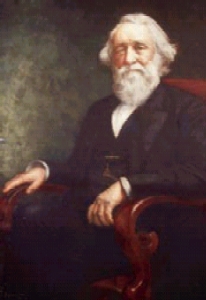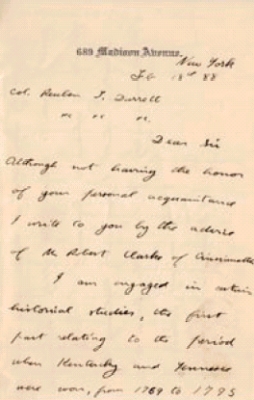Browsing In Our Archives: Theodore Roosevelt writes Filson founder Reuben Durrett
By James J. Holmberg
Curator of Special Collections
About |
 In 1933, Otto Rothert, long time editor of The Filson Club History Quarterly, initiated a series he dubbed
“Browsing in Our Archives.” “Browsing” was a wonderful feature in which manuscript items from The
Filson’s collection were highlighted in transcribed form, accompanied by an introduction and occasionally
light annotation. This was a way to let our members and the public enjoy and learn from manuscript
treasures preserved in our archives.
In 1933, Otto Rothert, long time editor of The Filson Club History Quarterly, initiated a series he dubbed
“Browsing in Our Archives.” “Browsing” was a wonderful feature in which manuscript items from The
Filson’s collection were highlighted in transcribed form, accompanied by an introduction and occasionally
light annotation. This was a way to let our members and the public enjoy and learn from manuscript
treasures preserved in our archives.
Edited letters did appear in the Filson’s quarterly after Rothert’s tenure as editor, but not under this regular title. The same is true for the current Ohio Valley History. The Filson routinely contains updates on new acquisitions and articles on specific collections, but single items haven’t been regularly featured. Now they will be. Appearing periodically in The Filson, “Browsing” will feature letters, documents, diary excerpts, photographs, prints, and other appropriate items from The Filson’s vast archive of historical material. “Uncle Otto,” as Rothert was fondly called by the young Kentucky historians whom he mentored, said it best in his 1933 introduction to the inaugural “Browsing,” when he wrote that “Browsing in our Archives is a joy we feel should be shared” with others so they will know what The Filson is preserving “for the benefit of present and future generations.”1
In casting about for an appropriate item for the revival of “Browsing,” I wanted to find something that harkened back to the early days of The Filson and had historical importance, as well as an item that reflected the title, something found while looking through collections. I think the letter presented here accomplishes that. It comes from a collection of Reuben Durrett’s papers currently being processed that has proved to contain good historical material, including eight letters of Theodore Roosevelt (1858-1919) to Durrett (1824-1913). What a grand opportunity to showcase a letter not only written by an American titan but also relating to the early days of The Filson! The letter, dated 18 February 1888, is Roosevelt’s first to Durrett. The letter includes all three criteria for “Browsing” and it is a pleasure to share it with you here.
* * * * * * * * * *
Theodore Roosevelt first made Reuben Durrett’s acquaintance
in early 1888 while working on his four-volume The Winning of the West
(1889-1896). A young unknown at the time, with no national reputation
or exploits behind him, Roosevelt was conducting research for his history
of that “First West” of America, the trans-Appalachian frontier. He
journeyed to Louisville in April 1888 to consult the noted collector and
amateur historian and use his vast collection. Durrett had been the
primary founder of The Filson Club just a  few years earlier, and for years
had been amassing one of the finest collections of printed and manuscript
material on Kentucky and the trans-Appalachian frontier. In addition to
his research visit to Durrett’s home to consult his collection – and The
Filson’s (which was housed with Durrett’s library) – Roosevelt also
spoke at a meeting of The Filson. How gratifying it must have been for
Durrett and others to welcome him back to Louisville in 1905 as President
of the United States. But that was in the future. In 1888 Roosevelt had
only recently returned from the West, where he had bought a ranch in North
Dakota and become a passionate hunter and advocate of outdoor life.
But he was also passionate about history and America’s heritage, and
he decided to write a history of the nation’s early steps westward.
few years earlier, and for years
had been amassing one of the finest collections of printed and manuscript
material on Kentucky and the trans-Appalachian frontier. In addition to
his research visit to Durrett’s home to consult his collection – and The
Filson’s (which was housed with Durrett’s library) – Roosevelt also
spoke at a meeting of The Filson. How gratifying it must have been for
Durrett and others to welcome him back to Louisville in 1905 as President
of the United States. But that was in the future. In 1888 Roosevelt had
only recently returned from the West, where he had bought a ranch in North
Dakota and become a passionate hunter and advocate of outdoor life.
But he was also passionate about history and America’s heritage, and
he decided to write a history of the nation’s early steps westward.
New York
Fb 18th 88
Col. Reuben T. Durrett
& c & c & c
Dear Sir
Although not having the honor of your personal acquaintance I write
to you by the advice of Mr. Robert Clarke2 of
Cincinnatti.
I am engaged in certain historical studies, the first part relating to the period when Kentucky and Tennesee were won, from 1769 to 1795 or thereabouts; and I know of no one to whom I could apply, save yourself, who could put me in the way of getting the information I need.
Most of the printed matter I have seen; but do you know if there are any mss., such as diaries or letters, of Shelby, Boone, Clarke or their contemporaries, to which I could get access? Any diaries of any of the first settlers, or of their immediate successors would be invaluable to me.3
Do you by any chance know who would be a good person to whom to apply for similar information in reference to Tennesee?4
Trusting that I am not trespasing too far on your courtesy, I have the honor to be
Very sincerely yours
Theodore Roosevelt
1. Otto Arthur Rothert (1871-1956) became a member of The Filson in 1908, secretary of the organization in 1917, and editor of the quarterly in 1928 (retiring in 1945). He used his research, writing, and editorial skills to establish a respected and scholarly reputation for himself and for The Filson. (Otto A. Rothert, “Browsing in Our Archives: Three Letters by Dr. L. P. Yandell, 1838,” The Filson Club History Quarterly 7 (July 1933), 148.)
2. Robert E. Clarke (1829-1899) was a native of Scotland who came to America in 1840, settling with his parents in Cincinnati. He became a noted book collector, bookseller, and publisher and was particularly interested in the pioneer Ohio Valley.
3. Roosevelt is of course referring to Isaac Shelby, Daniel Boone, and George Rogers Clark. Roosevelt acknowledged Durrett’s assistance in the preface of volume one of The Winning of the West, writing “For original matter connected to Kentucky, I am greatly indebted to Col. Reuben T. Durrett, of Louisville, the founder of the “Filson Club,” which has done such admirable historical work of late years. He allowed me to work at my leisure in his library, the most complete in the world on all subjects connected with Kentucky history.” He then listed many of the historical items in Durrett’s library he consulted. Interestingly, Roosevelt apparently did not have access to another great collection of frontier material – the Lyman Draper Manuscripts – until after the latter’s death in 1891. Roosevelt cites their use in volumes three and four. (Theodore Roosevelt, The Winning of the West, New York, G. P. Putnam’s Sons, 1889, 1:xxvi-xxvii, 3:xvii.)
4. Whether Durrett supplied the names of Tennessee contacts for Roosevelt has not
been determined. The Roosevelt Papers at the Library of Congress forms one of the
largest presidential papers collections at that
institution and it is quite likely a search of the correspondence would reveal Durrett’s letters.
One way or the other, Roosevelt located a wealth of Tennessee material, as noted by him
in the preface preceding his thanks to Durrett. (Roosevelt, 1:xxv-xxvi.)
The Filson Historical Society
1310 South Third Street - Louisville, KY 40208
Phone: (502) 635-5083 Fax: (502) 635-5086
Hours
The Ferguson Mansion and Office
Monday - Friday: 9 am. - 5 pm.
Saturday and Sunday closed
Library
Monday - Friday: 9 am. - 5 pm.
Saturday: 9 am. - 12 noon
